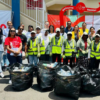New Plastic Waste Collection Centers in Egypt
Henkel and Plastic Bank Open Plastic Waste Collection Centers in Egypt
In Cairo, Henkel and Plastic Bank opened the first three of their plastic waste collection centers. Henkel’s collaboration with the social enterprise includes this initiative. The partners share a common goal: to reduce plastic waste in the ocean while also benefiting the local community in the long run.
The establishment of three collection centers in Egypt is the first step in the country’s commitment to deliver environmental, social, and economic effects. Henkel and Plastic Bank intend to increase their involvement in the coming years, with a goal of collecting 5,000 tons of plastic waste per year by 2023.
The opening of three collection centers in Egypt marks the first step of the commitment to deliver environmental, social and economic impact in the country. Henkel and Plastic Bank aim to expand its engagement in the coming years and to reach a yearly collection capacity of 5,000 tons of plastic waste in 2023. At the collection centers, people can return collected plastic waste and exchange it for money. This prevents the plastic from entering the rivers and oceans, and at the same time Henkel and Plastic Bank reports it can also support the local population by improving the lives of collector communities. Plastic Bank reprocesses the material and returns the so-called Social Plastic back to the value chain — for example in Henkel’s product packaging. Henkel was the first global consumer goods company to partner with Plastic Bank in 2017 and has already launched first product packaging made from Social Plastic in the market.
The Plastic Bank, under the slogan “Turning Waste into Opportunities,” creates recycling ecosystems in countries where waste management infrastructure is still lacking. As part of a closed-loop supply chain, the collected plastic is recycled into Social Plastic, which can then be reintegrated into goods and packaging. Henkel and Plastic Bank plan to build 1,000 jobs in Egypt over the next two years through the establishment.
Affirmation to a Circular Economy Commitment, according to Henkel, by 2025, all packaging will be recyclable or reusable (with the exception of products whose ingredients or residue can affect recyclability or pollute recycling streams), and the percentage of recycled plastic in consumer product packaging will increase to 30%. Many food packaging materials are now made entirely of recycled plastic.
For more information, visit www.henkel.com and www.plasticbank.com.
Source: New Plastic Waste collection centre in Egypt
This article was originally posted on www.flexpackmag.com.



